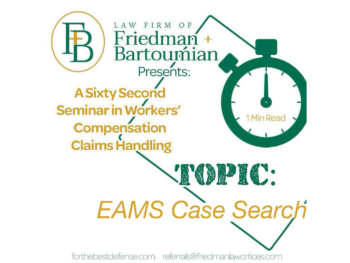The other day a claims adjuster reported an applicant attorney to the company’s SIU department for suspected workers’ compensation fraud. The attorney had been handling a death claim where he named a widow and two grandchildren as dependents. The claims adjuster accepted liability for the widow but disputed dependency as to the grandchildren.
At the time of settlement, the administrator offered to pay the full $250,000 death benefit to the widow but nothing to the grandchildren. The offer was accepted. When drafting a C&R the applicant attorney was advised he would be required to explain to the judge why the grandchildren were receiving nothing. Applicant attorney balked at the idea of providing an explanation, so instead he simply withdrew the grandchildren’s names as dependents. In justification, counsel stated that the grandchildren were never really dependents to begin with. In other words, when the claim was filed counsel just added the grandchildren to the application to increase the settlement value of the case. It was at this time the adjuster reported the attorney to SIU.
Unfortunately, applicant attorneys are taught to add dependents in death claims. In fact, at last year’s CAAA conference, a guest speaker advised the audience to list as many dependents as possible, including someone who was paid only to mow the lawn, to increase the value of the claim.
When an applicant attorney deliberately and inappropriately lists someone as a dependent, with full knowledge that such representation is false, then such action may be considered fraudulent. It is tantamount to an employee filing a claim to collect work comp benefits, knowing full well the injury occurred while on vacation and not at work. It is a violation of Insurance Code §1871.4 to file a false workers’ compensation claim. In our death claim example, the same principle applies, where counsel sought to collect benefits on behalf of two grandchildren, while being fully aware they were not dependents. For this reason, the claims adjuster made a fraud referral.
Having written the above, we wish to remind everyone it is very difficult to prove fraud. As always, everything depends on the evidence. In our example, the claims administrator was fortunate that AA admitted in front of witnesses that the grandchildren were never dependents to begin with. Even though fraud may be difficult to prove, reporting suspected fraud to SIU may send a message to the applicants’ bar that the defense industry is watching. Employers should not tolerate such blatant fraudulent tactics that end up damaging a system designed to help those truly dependent on a family member who is now being mourned as a lost loved one.


Leave a Reply